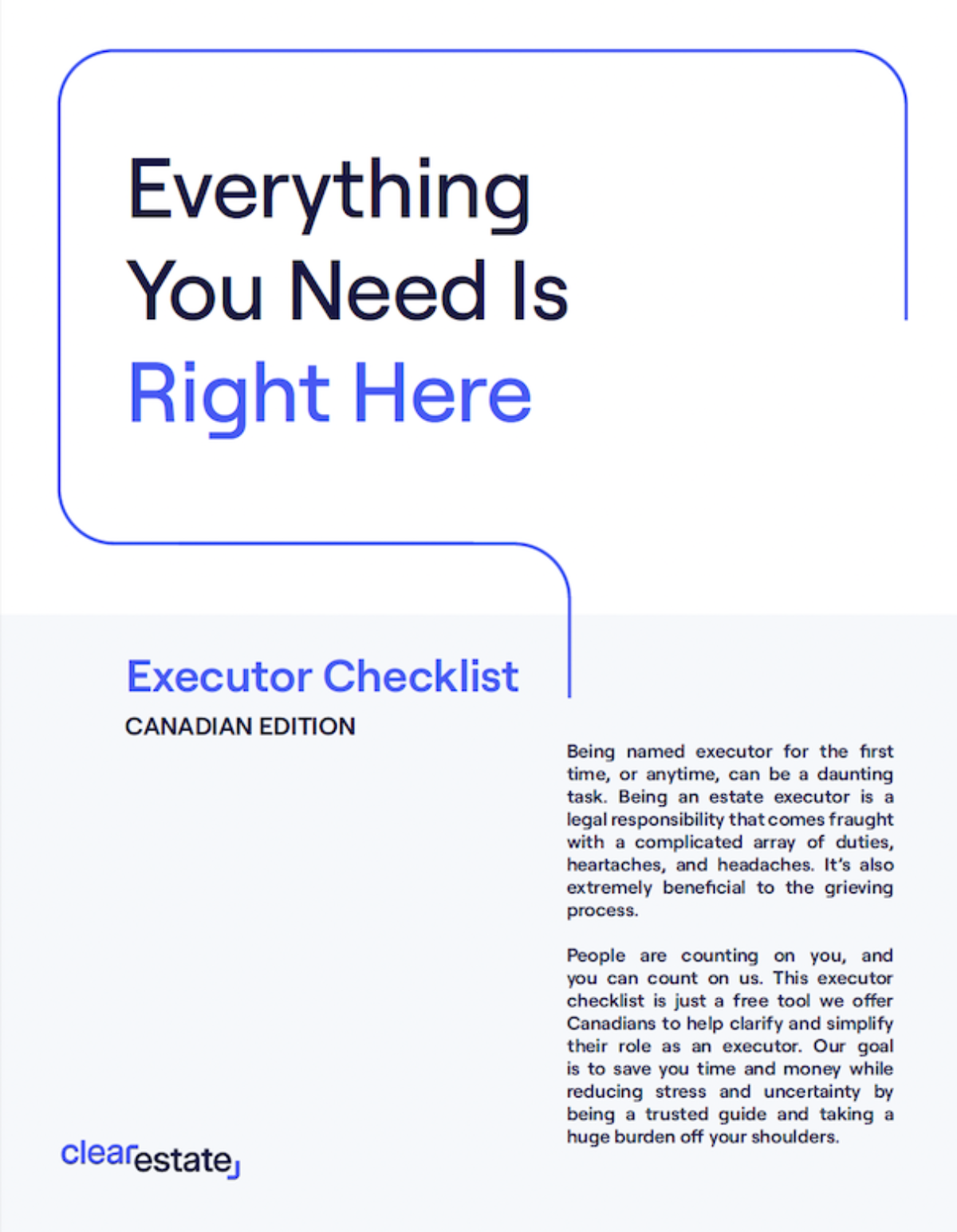Estate Settlement
Dec 04, 2024
How Do Executors Mail Inheritance Checks?
Find out how inheritance checks are mailed, including security measures and what to do if there are delays in receiving them.
As an executor of an estate in Ontario, it's important to know what you will be doing. In this guide, we take you through your duties as an executor - step by step.


The duties that come with being named an estate executor for the first time, or anytime, can be a daunting task. As an executor or “estate trustee” you are faced with legal responsibility that comes fraught with a complicated array of duties, heartaches, and headaches. It’s also extremely detrimental to the grieving process.
People are counting on you, and you can count on us. This executor checklist is your blueprint we use to help clarify and simplify your duties as an executor; in the early stages, the probate process, and final distribution.
Our goal is to save you time and money while reducing stress and uncertainty by being a trusted guide and taking a huge burden off your shoulders.
GOAL: Arrange for funeral
WHEN: Right after death
DURATION: 5 to 10 days
GOAL: Submit official paperwork to protect the estate
WHEN: 0 to 10 days after the funeral
DURATION: A few days
GOAL: Protect the Estate by securing the value of the hard assets.
WHEN: 0 to 30 days after the funeral
DURATION: 2 -3 weeks
GOAL: Prepare for probate, by doing an inventory of all assets and liabilities
WHEN: 10 to 45 days after the funeral
DURATION: 1-2 weeks
Find out about ongoing expenses and debts.
Stop all unnecessary expenses: Subscriptions (magazine, theatre), Health care (home care), Memberships (gym, club, sports, auto, professional, etc), Entertainment (cable, satellite, websites), Communication (telephone, cell phone, Internet), Insurance (auto, disability).
Notify all holders of assets: Bank, Broker, Investment advisor, Insurer.
Cancel credit and debit card(s)
*** DO NOT CANCEL THE SOCIAL INSURANCE NUMBER UNTIL TAXES HAVE BEEN FILED
GOAL: Create transparency for everyone and dramatically reduce the risk of litigation
WHEN: 30 to 45 days after the funeral
DURATION: 1-3 days
GOAL: Probate is the act of confirming the last will and testament of the deceased, and/or appointing an executor for the estate to carry out proper distribution.
WHEN: 30 to 60 days after the funeral
DURATION: 1-2 weeks
GOAL: Probate may take months, but that’s no reason to stay idle
WHEN: 5 to 12 months after the funeral
DURATION: 2 to 9 months
GOAL: Liquidate the assets and aggregate under a single estate bank account
WHEN: Immediately after receiving the grant of probate
DURATION: 2 to several weeks
GOAL: Ready the estate for distribution by settling the debts and preparing taxes
WHEN: 2-4 weeks after receiving the grant of probate
DURATION: 1 to 2 weeks
GOAL: Coordinate with beneficiaries to distribute some of the inheritance
WHEN: 1-2 weeks after filing taxes
DURATION: 1 to 2 weeks
GOAL: Coordinate with beneficiaries for the final distribution of the inheritance
WHEN: 1-2 weeks after filing taxes
DURATION: 1 to 2 weeks

Although there is no statutory executor fee in Ontario, the general rule is that an executor is paid 5% of the gross value of the estate.
The rationale behind the 5% calculation goes as follows:
2.5% represent all capital receipts and disbursements
• 2.5% represents all revenue receipts and disbursements.
You can read more about the executor's compensation in our detailed blog post here
Executors of an estate are often surprised to learn that they are entitled to reimbursement for many of the expenses they incur while administering the estate.
These expenses can include:
In order to be reimbursed, executors must keep accurate records of all their expenses and submit them to the court for approval. With proper documentation, executors can ensure that they are reimbursed for all of their out-of-pocket expenses.
Being an executor of an estate can be a difficult and time-consuming task, especially if you are inexperienced. Probating a will in Ontario can be a complicated process, and there are many deadlines and rules that must be followed. Executors are responsible for ensuring that all of the deceased's assets are properly distributed to their beneficiaries.
This can be a challenging task, as executors must locate and identify all of the assets, value them, and then pay any debts and taxes owed on them. Executors must also keep accurate records and communicate regularly with the beneficiaries. If you are a named executor of a will, it is important to understand your responsibilities involved.
 Simplify Probate Today
Simplify Probate Today
Get expert guidance from our probate specialists who've helped 10,000+ families.
Book a free consultation today